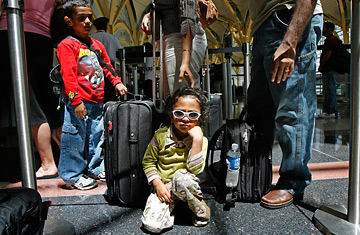
A young passenger waits to check in for her flight at Ronald Reagan Washington National Airport, May 25, 2007.
Any beleaguered air traveler who has sat stranded in a terminal — or worse yet, virtually held hostage on the tarmac — as flights are delayed knows the feeling that things can't get worse. Well, think again, say the industry's defenders. Now that some members of Congress have decided to try to fix things by passing a passenger bill of rights, they argue, the situation at the nation's airports could become more maddening and dysfunctional, with more delays and higher fares.
And there's no denying that they're already pretty bad. On Friday, an FAA computer glitch caused massive delays and cancellations for hundreds of planes up and down the East Coast. This came just four days after the Department of Transportation announced that airline delays are at their highest level since 1996, when the government started tracking the numbers. During the first four months of 2007, 27.6% of flights on U.S. carriers were delayed by more than 15 minutes or canceled. That news only confirmed what people already knew after the industry suffered terrible publicity on Valentine's Day, when nine JetBlue planes were stranded on a JFK airport tarmac for up to 10 hours due to an ice storm. Less than two months earlier, on Dec. 29, 67 American Airlines planes across the nation had sat on tarmac for more than three hours because of storms in Texas. Passengers inside those planes would later describe the experience as "inhumane." Toilets overflowed. Cabin temperatures rose. Little food and water was available. Or so passengers contend. Both JetBlue and American Airlines say that toilets never overflowed and water was always available to passengers.
"Mistakes were made on many levels," says David Castelveter, a spokesman for the Air Transport Association (ATA), which represents 90% of commercial airlines in the United States. "But this happens a fraction of a fraction of the time." In 2006, more than 4.5 million flights in the United States departed within 15 minutes of leaving the gate, according to the DOT. Conversely, 224 flights sat on the tarmac for more than 4 hours.
Industry experts say the bad publicity American Airlines and JetBlue received was enough to prevent airlines from repeating the mistakes again. "The marketplace handled this by giving terrible publicity to the airlines," says David Stempler, president of the Air Travelers Association. "JetBlue became a punch line and lost [millions] in revenue." After the incidents, both airlines sent the stranded passengers travel vouchers and letters of apology. JetBlue also enacted its own "Customer Bill of Rights," which says that passengers will not be stranded on the tarmac for more than five hours. It also entitles stranded passengers to travel vouchers if the cause of the delay was within JetBlue's control (weather problems, which account for about 42% of all the industry's delays, are considered uncontrollable).
Still, some lawmakers want to regulate how long a plane can sit on the tarmac. In March, "The Airline Passenger's Bill of Rights" was introduced in both the House, by Rep. Mike Thompson, a California Democrat, and the Senate, by Barbara Boxer, a California Democrat, and Olympia Snowe, a Maine Republican. Under the bill, passengers reserve the right to deplane after four hours on the tarmac. Airlines would also be required to keep an adequate amount of food and water on hand, to maintain sanitary conditions and to keep passengers informed of the cause and timing of delays. If airlines fail to meet this requirement, they will have broken their contract with the passengers, who can then take legal action against the airlines. The Bill of Rights would not require airlines to reimburse passengers or provide flight vouchers.
